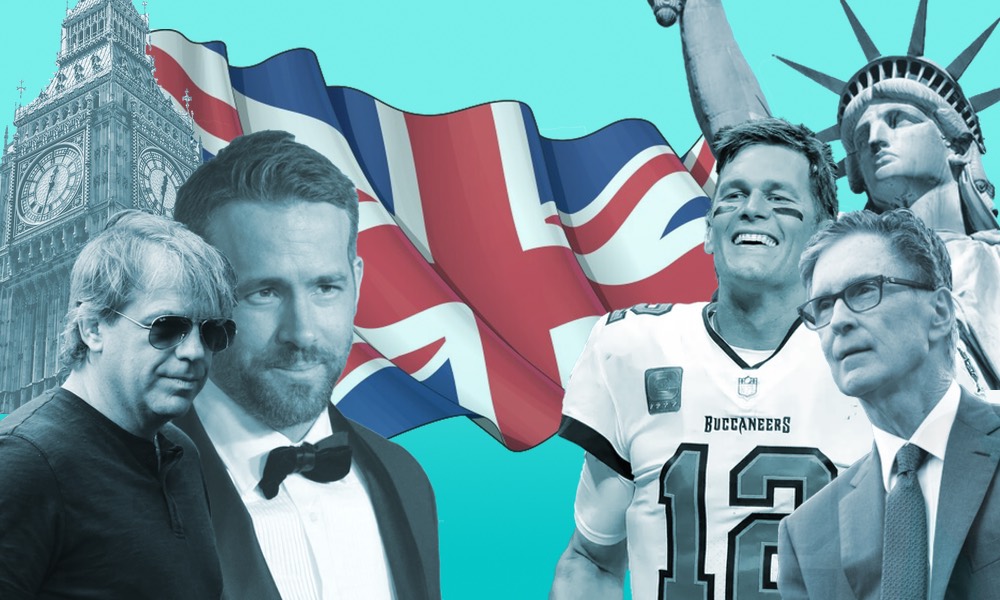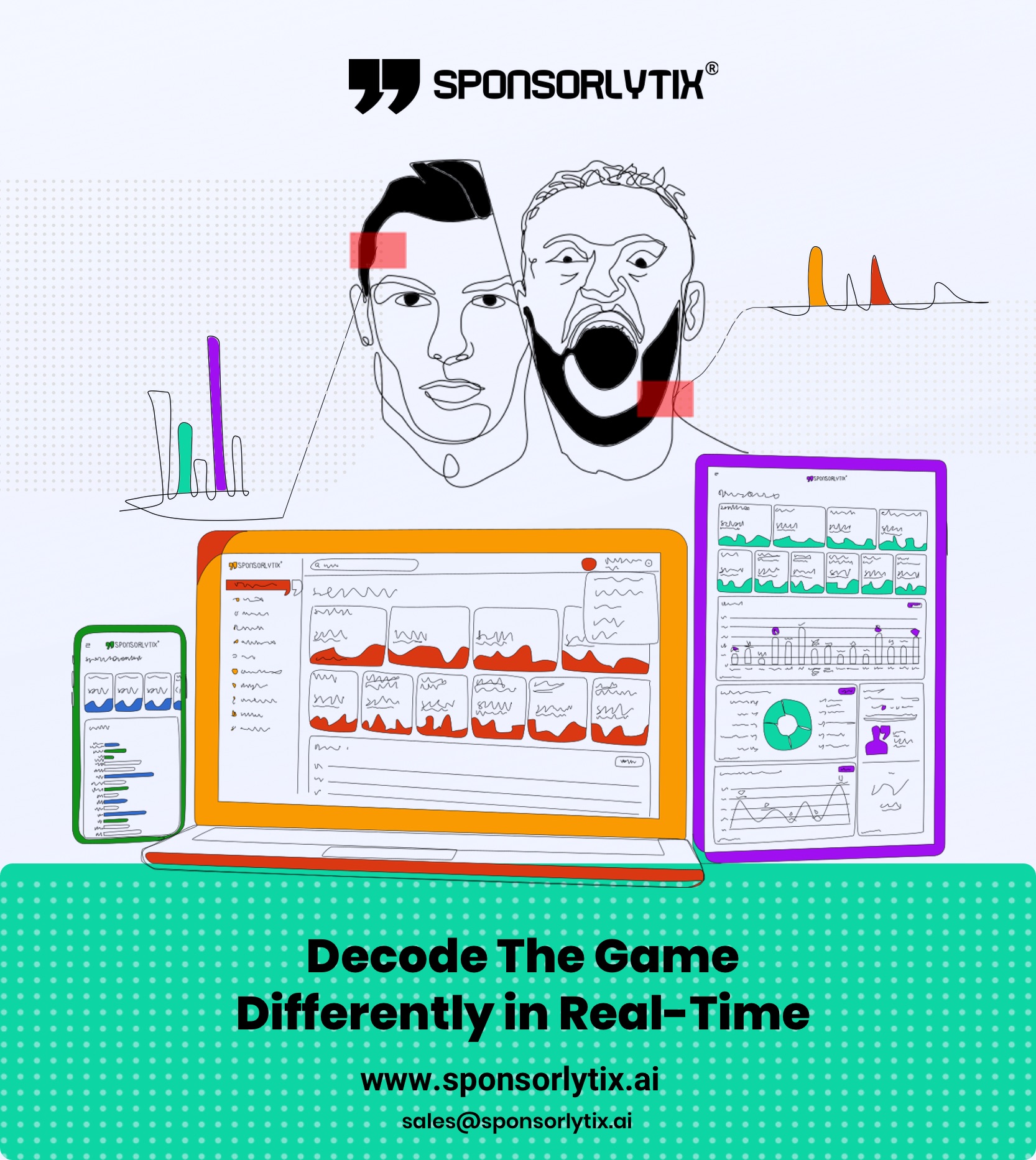|
Listen to this Article (Audio)
|
An American revolution is reshaping the heartlands of British football. Once a quintessentially English sport, it is now being  redefined by the influence of American investors, Hollywood celebrities, and Wall Street strategists. The Sports Journal dives into this transformative wave, exploring its depth and impact across the British football pyramid. From analyzing the numbers and profiling the key players to examining financial ramifications and debating cultural shifts, we ask the pressing question: is this transatlantic takeover driving football towards newfound glory or stirring up controversy?
redefined by the influence of American investors, Hollywood celebrities, and Wall Street strategists. The Sports Journal dives into this transformative wave, exploring its depth and impact across the British football pyramid. From analyzing the numbers and profiling the key players to examining financial ramifications and debating cultural shifts, we ask the pressing question: is this transatlantic takeover driving football towards newfound glory or stirring up controversy?
For years, football pundits and legacy media outlets have engaged in a pattern of gaslighting fans regarding Middle Eastern ownership of clubs, often highlighting exaggerated or non-existent threats. They’ve painted these owners with broad strokes, focusing without the nuance or evidence required for fair journalism. This selective outrage is part of their role, but more fundamentally, their job is to report the truth impartially. When they fail to do so by sensationalizing or skewing narratives to fit a particular agenda, they compromise their integrity as journalists and pundits.
American Ownership Across the British Football League
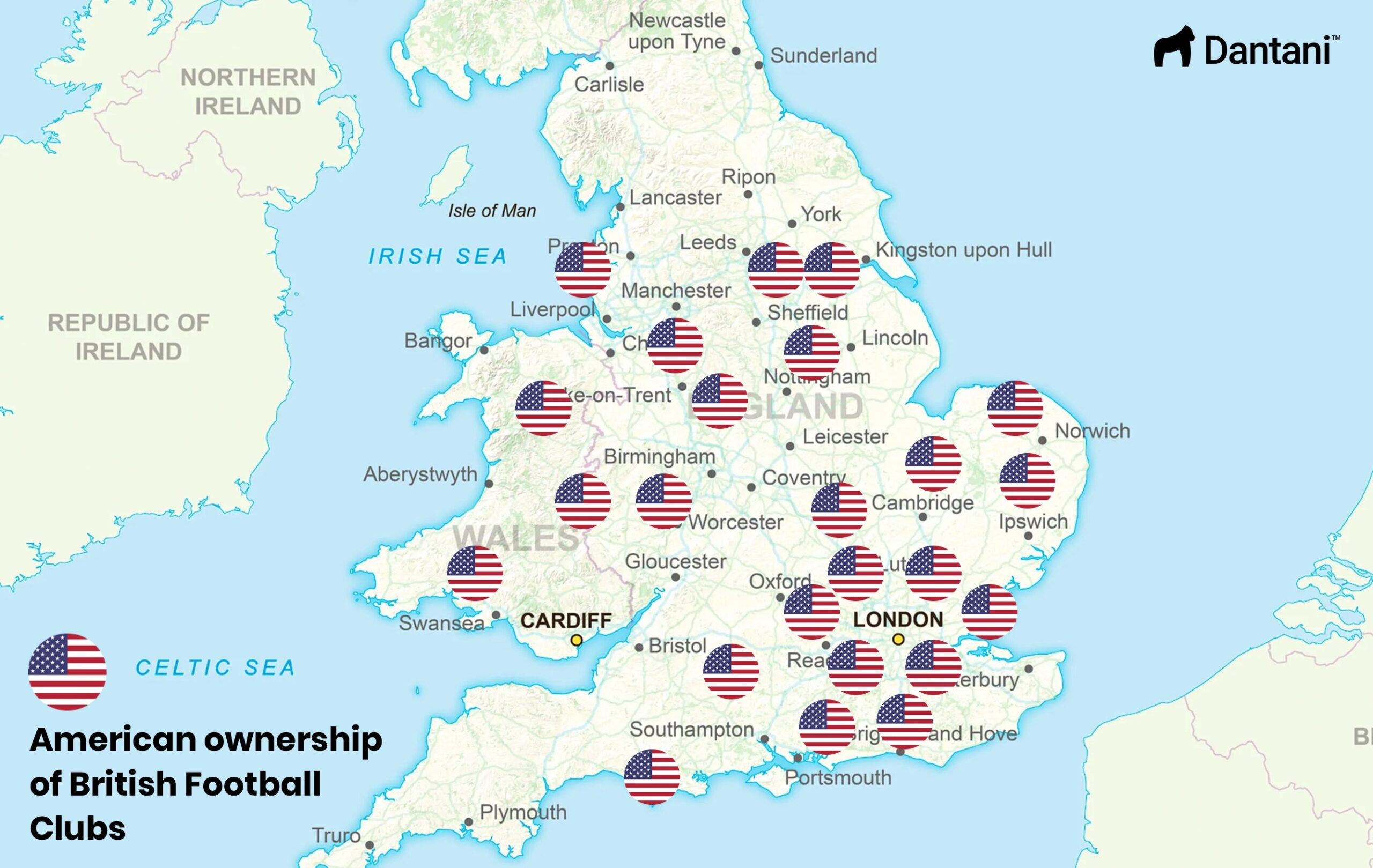
Source: Sponsorlytix, Dantani Sports
However, this scrutiny rarely extends to American owners, despite the U.S. government running global illegal surveillance programmes (which they repeatedly lied about in congress), international military engagements, where millions have died and cultural impositions like the aggressive promotion of certain social agendas. This discrepancy in coverage suggests a bias where American malfeasance, whether in surveillance, warfare, or cultural exportation, is seldom critiqued with the same vigor or frequency, exposing a double standard in western sports journalism.
 While much of the media and fan discourse has been dominated by discussions around Middle Eastern ownership, particularly in clubs like Manchester City and Newcastle United, the American influence has been quietly but steadily growing. Since the early 2000s, Americans have been acquiring stakes in clubs across all levels of the football pyramid, often with less public scrutiny. This gradual takeover has been strategic, focusing not just on the Premier League but also on lower leagues, where clubs can be transformed with less upfront investment but potentially high returns.
While much of the media and fan discourse has been dominated by discussions around Middle Eastern ownership, particularly in clubs like Manchester City and Newcastle United, the American influence has been quietly but steadily growing. Since the early 2000s, Americans have been acquiring stakes in clubs across all levels of the football pyramid, often with less public scrutiny. This gradual takeover has been strategic, focusing not just on the Premier League but also on lower leagues, where clubs can be transformed with less upfront investment but potentially high returns.
Wondering why American investors and celebrities buy football clubs in the UK in lower leagues?
Compared to the steep entry fees for owning teams in major U.S. sports leagues like the NFL, where a franchise can cost upwards of $2.2 billion, or the NBA, English football clubs, particularly those in the lower tiers, present a more accessible investment opportunity. For instance, the cost of establishing a new franchise in the MLS is around $500 million, which is substantial yet dwarfed by NFL figures.
Declining Legacy Media’s Propaganda on Saudi Arabia 2034 FIFA World Cup Hosting
The presence of American investors in British football has grown from a mere curiosity to a pivotal force shaping club destinies. Here’s how widespread their influence is:
American Ownership Across the British Football League
| Club | Location | League | Owners |
| Arsenal | London | Premier League | Stan Kroenke |
| Manchester United | Manchester | Premier League | Glazer Family |
| Liverpool | Liverpool | Premier League | Fenway Sports Group |
| Chelsea | London | Premier League | Todd Boehly, Clearlake Capital |
| Fulham | London | Premier League | Shahid Khan |
| Crystal Palace | London | Premier League | John Textor (Eagle Football Holdings) |
| Aston Villa | Birmingham | Premier League | Wes Edens, Nassef Sawiris |
| Bournemouth | Bournemouth | Premier League | Bill Foley |
| Ipswich Town | Ipswich | Premier League | Gamechanger 2020 |
| Burnley | Burnley | Championship | ALK Capital |
| Leeds United | Leeds | Championship | 49ers Enterprises |
| Birmingham City | Birmingham | Championship | Tom Wagner, Knighthead Capital Management |
| Swansea City | Swansea | Championship | Jason Levien, Steve Kaplan |
| West Bromwich Albion | West Bromwich | Championship | Shilen Patel (has American ties) |
| Sheffield United | Sheffield | Championship | US consortium (Stephen Rosen & Helmy Eltoukhy) |
| Norwich City | Norwich | Championship | Mark Attanasio |
| Millwall | Millwall | Championship | Millwall holdings, James Berylson |
| Barnsley | Barnsley | League One | Billy Beane (part of international consortium) |
| Wrexham AFC | Wrexham | League One | Ryan Reynolds, Rob McElhenney |
| Charlton Athletic | London | League One | Thomas Sandgaard |
| Cambridge United | Cambridge | League One | Adam Webb, Mark Green |
| Portsmouth | Portsmouth | League One | Michael Eisner |
| Crawley Town | Crawley | League Two | WAGMI United (American consortium) |
Source: Sponsorlytix, Dantani Sports
Saudi Pro League vs Major League Soccer – Which League is Better? – Inside Investigation
In contrast, acquiring a team in England’s EFL Championship might cost anywhere from $30 million to $60 million, while a League One club could be purchased for as little as $25 million or less, depending on the club’s history, fan base, and financial health. This significant disparity in investment costs allows American investors to enter the sports ownership market in English football with a much lower financial threshold, thus reducing potential risk while still tapping into the passion and global appeal of the sport.
The American influence in British football is a narrative of transformation, raising questions about the future of the sport. While it has brought undeniable benefits in terms of innovation and financial strength, it also poses risks to the cultural and communal aspects of football. The challenge lies in balancing these elements—ensuring that while clubs grow financially, they do not lose the essence that makes football so beloved. As this chapter of football history unfolds, it will be the responsibility of all stakeholders—owners, fans, players, and governing bodies—to navigate this new era with a view towards preserving the heart of the game amidst its growing commercial allure.
While it has brought undeniable benefits in terms of innovation and financial strength, it also poses risks to the cultural and communal aspects of football. The challenge lies in balancing these elements—ensuring that while clubs grow financially, they do not lose the essence that makes football so beloved. As this chapter of football history unfolds, it will be the responsibility of all stakeholders—owners, fans, players, and governing bodies—to navigate this new era with a view towards preserving the heart of the game amidst its growing commercial allure.
Source: Sponsorlytix, Dantani Sports
According to data from Sponsorlytix and Dantani Sports, over the last decade, American investment in British football has
increased by 200%, with a notable focus not just on Premier League clubs but also on clubs in lower divisions like League One and Two.
American Ownership Across the Football League
| Division | No. of Clubs | US Owners | Total % | Notable Clubs |
| Premier League | 9 | 45% | Chelsea, Liverpool, Manchester United |
| Championship | 8 | 33% | Birmingham City (Tom Brady), Swansea City |
| League One | 5 | 21% | Wrexham AFC ( Ryan Reynolds) |
| League 2 | 1 | 4% | Crawley Town |
| Total | 23 | 25% |
Source: Sponsorlytix, Dantani Sports
Uncovering The Dark Underworld of Illegal Sports Streaming and Piracy
Clubs like Luton Town, which have seen American investment, have shown how promotion can significantly increase a club’s valuation. For instance, moving from the Championship to the Premier League can result in a valuation increase by a factor of 10-20% or more due to increased broadcasting rights, sponsorship deals, and revenue from matchdays.
 Research indicates that clubs under American ownership, particularly those acquired through leveraged buyouts, often see a rise in debt, which can be both a tool for growth or a burden. For example, Manchester United’s debt has been a focal point of fan protests, with the club’s debt levels reportedly exceeding £500 million since the Glazer acquisition.
Research indicates that clubs under American ownership, particularly those acquired through leveraged buyouts, often see a rise in debt, which can be both a tool for growth or a burden. For example, Manchester United’s debt has been a focal point of fan protests, with the club’s debt levels reportedly exceeding £500 million since the Glazer acquisition.
The English football league system’s structure of promotion and relegation provides an opportunity for clubs to increase in value dramatically if they move up through the leagues. A promotion can multiply a club’s value, offering a significant return on investment if the club ascends to higher divisions, particularly to the Premier League.
High-profile acquisitions like that of Wrexham by Ryan Reynolds and Rob McElhenney have shown how success stories or even attempts at success can generate significant media interest, documentaries, and global attention, which in turn can add value to the club and the brand of the owners.
American Ownership Across the Premier League
| Club | Primary American Owner | Year Acquired | Investment Type |
| Arsenal | Stan Kroenke | 2011 | Majority Stake |
| Manchester United | Glazer Family | 2005 | Full Ownership |
| Liverpool | Fenway Sports Group | 2010 | Full Ownership |
| Chelsea | Todd Boehly, Clearlake Capital | 2022 | Majority Stake |
| Fulham | Shahid Khan | 2013 | Full Ownership |
| Crystal Palace | John Textor (Eagle Football Holdings) | 2021 | Minority Stake |
| Aston Villa | Wes Edens, Nassef Sawiris | 2018 | Majority Stake |
| Bournemouth | Bill Foley | 2022 | Full Ownership |
| Ipswich Town | Gamechanger 2020 | 2021 | Majority Stake |
Source: Sponsorlytix, Dantani Sports
How AI and Computer Vision Technology is Redefining Sports Analysis and Data
American celebrities have increasingly invested in football not just for financial returns but to amplify their influence and 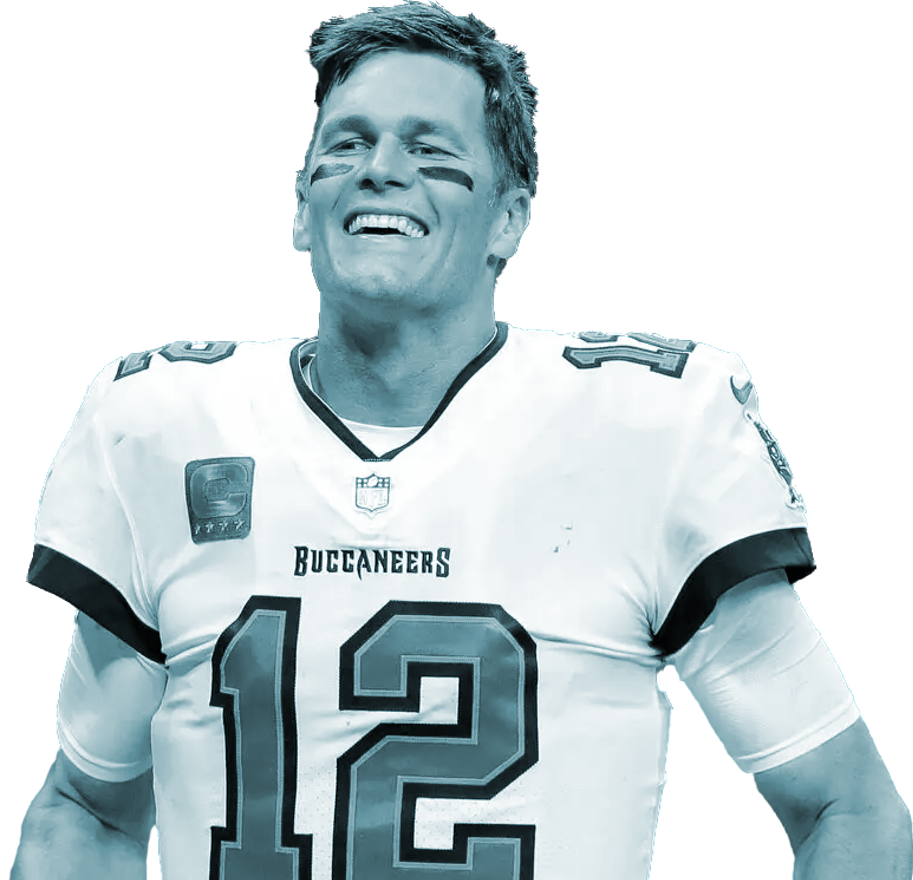 connect with global audiences. Ryan Reynolds and Rob McElhenney have turned Wrexham into a global sensation, aided by their personal involvement and the success of the Disney+ series Welcome to Wrexham. Similarly, NFL legends Tom Brady and JJ Watt have brought their star power to Birmingham City and Burnley, while Will Ferrell has joined forces with golfers Jordan Spieth and Justin Thomas to co-own Leeds United.
connect with global audiences. Ryan Reynolds and Rob McElhenney have turned Wrexham into a global sensation, aided by their personal involvement and the success of the Disney+ series Welcome to Wrexham. Similarly, NFL legends Tom Brady and JJ Watt have brought their star power to Birmingham City and Burnley, while Will Ferrell has joined forces with golfers Jordan Spieth and Justin Thomas to co-own Leeds United.
The cultural impact of American ownership has sparked both admiration and debate. Many owners are praised for engaging directly with fans and revitalizing community ties, breathing new life into clubs’ local support. However, tensions often arise between preserving traditional club identities and implementing modern business strategies, with some fans protesting against what they see as excessive commercialization.
Source: Sponsorlytix, Dantani Sports
American ownership has brought a business model that focuses on commercial expansion and strategic financial practices. Clubs under this model have experienced significant growth in merchandising, sponsorship deals, and their global fanbase, driven by targeted marketing strategies. However, some of these clubs have been acquired through leveraged buyouts, raising concerns about their long-term financial stability.
But the important question in everyone’s mind, is American influence damaging football?
In an era where football is as much a business as it is a sport, the surge of American investment into British football has ignited a multifaceted debate, revealing the good, the bad, and the ugly sides of this transatlantic phenomenon.
Source: Sponsorlytix, Dantani Sports
American owners have often brought a fresh perspective to club management. Clubs like Arsenal under Stan Kroenke have seen significant investments in infrastructure, such as the construction of the Emirates Stadium, which have been pivotal for financial growth. Moreover, the infusion of American business practices has introduced the use of data analytics, a staple in American sports, into football. This approach has begun to influence player recruitment and performance analysis, bringing a more scientific, data-driven strategy to team management, potentially enhancing decision-making processes on and off the pitch.
Richest American Owners in British Football
| Club | Primary American Owner | Year Acquired | Investment Type |
| Stan Kroenke | Arsenal | $13.2 Billion | Sports, Real Estate |
| Todd Boehly | Chelsea | $5.3 Billion | Private Equity, Sports |
| The Glazer Family | Man United | $4.7 Billion | Sports, Real Estate |
| John W. Henry | Liverpool | $4 Billion | Sports, Investments |
| Ryan Reynolds & Rob McElhenney | Wrexham | $400 Million | Entertainment, Spirits |
Source: Sponsorlytix, Dantani Sports
The Power of The Slap: Inside The Rise of Dana White’s New Combat Sports League
 American investment has, in many cases, provided clubs with the financial stability or the means to compete at higher levels. Liverpool, under the stewardship of Fenway Sports Group, exemplifies this trend. Not only has the club improved on the pitch, but significant strides have also been made in terms of commercial ventures and global branding. These efforts have substantially boosted their revenue streams, enabling Liverpool to sustain competitiveness and invest in squad development.
American investment has, in many cases, provided clubs with the financial stability or the means to compete at higher levels. Liverpool, under the stewardship of Fenway Sports Group, exemplifies this trend. Not only has the club improved on the pitch, but significant strides have also been made in terms of commercial ventures and global branding. These efforts have substantially boosted their revenue streams, enabling Liverpool to sustain competitiveness and invest in squad development.
The story of Wrexham AFC, now owned by Hollywood stars Ryan Reynolds and Rob McElhenney, serves as a testament to how celebrity involvement can rejuvenate a club. Their active engagement with the local community, from attending matches to celebrating successes with fans, has brought unprecedented global attention and local support. This hands-on approach has not only revitalized the club but has also potentially set a positive example for how club ownership can foster community spirit, increase fan engagement, and elevate the profile of smaller clubs on a worldwide stage.
Reports suggests that 43% of fans feel that American ownership has led to a more commercialized approach to club management, which they perceive as diluting traditional club culture.
Source: Sponsorlytix, Dantani Sports
Inside The Gaming Wars for Dominance Between Playstation, Xbox, Nintendo and Tencent
There’s a burgeoning concern among traditionalists that the very soul of football clubs’ is being compromised by American ownership. The essence of a club, deeply rooted in local identity, history, and community, may find itself overshadowed by business practices from across the Atlantic that prioritize profit margins over cultural heritage or local support. This shift could lead to a disconnect between the clubs and their traditional fan bases, potentially eroding the unique identities clubs have cultivated over decades.
Impact on Club Finances
| Club | Revenue Increase % | Debt Increase % | Transfer Spending Increase % |
| Arsenal | +80% | +150% | +100% |
| Manchester United | +50% | +70% | +80% |
| Liverpool | +120% | +50% | +200% |
| Chelsea | +30% | N/A | +50% |
| Fulham | +20% | +30% | +40% |
| Crystal Palace | +15% | +25% | +30% |
| Aston Villa | +40% | +50% | +60% |
| Bournemouth | +15% | +20% | +30% |
| Ipswich Town | +30% | +40% | +50% |
Source: Sponsorlytix, Dantani Sports
The introduction of advanced analytics in player scouting and performance analysis has been noted by clubs like Liverpool, where Fenway Sports Group has employed data analysts from baseball to enhance football strategies, which has been linked to their success in recent years, including winning the Champions League and Premier League.
Source: Sponsorlytix, Dantani Sports
American ownership has greatly amplified the global branding efforts of football clubs. Chelsea, under Todd Boehly’s leadership, experienced a 30% rise in international merchandise sales within just two years of his acquisition—a testament to the effectiveness of American marketing strategies in broadening a club’s reach. Boehly’s approach leverages innovative co-marketing with the LA Dodgers (his MLB team) and integrates advanced data analytics across the club. This includes optimizing scouting for academy youth and first-team players, analyzing opposition data for training preparation, and enhancing sponsorship tracking, showcasing a holistic, data-driven approach to modern club management.
Source: Sponsorlytix, Dantani Sports
Not all American takeovers have been without controversy, particularly concerning the financial health of the clubs. For 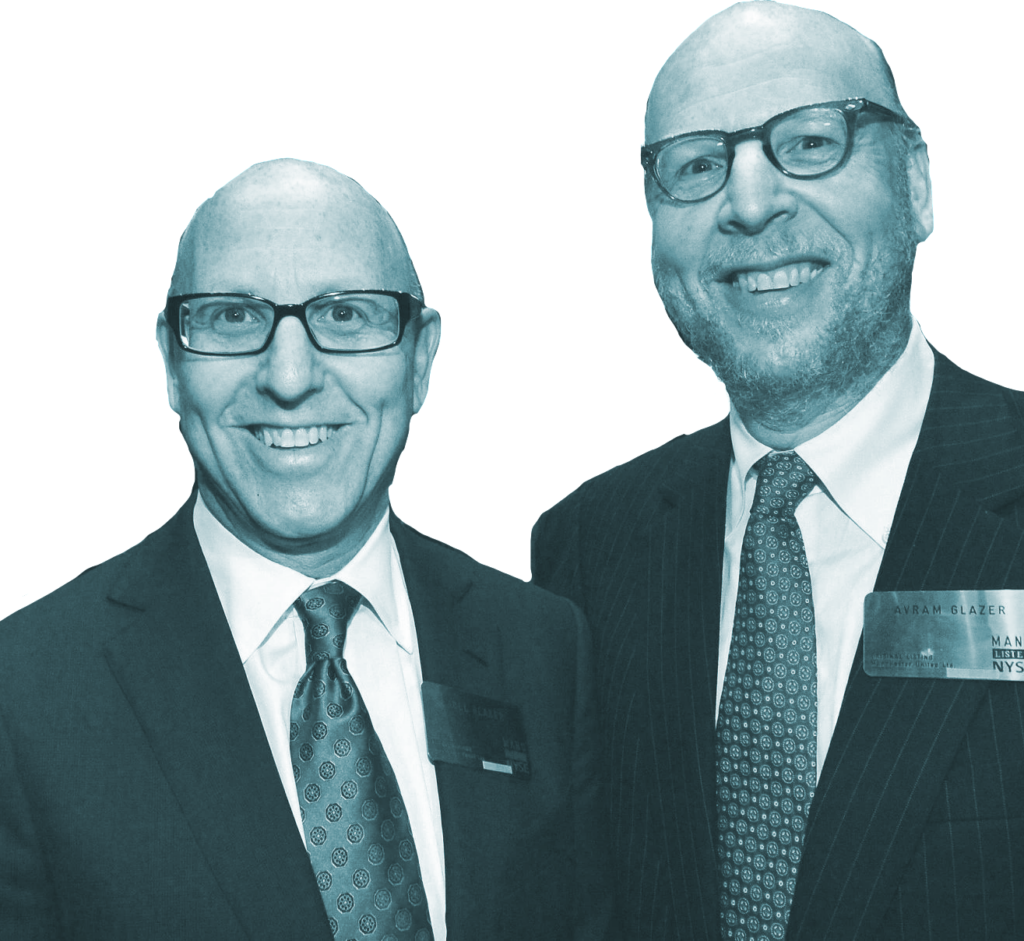 instance, Manchester United’s acquisition by the Glazer family through a leveraged buyout has led to significant debt for the club, sparking protests from fans who are wary of the long-term implications of such financial strategies. This model, while offering immediate funds for investment, can saddle clubs with debt that, if not managed with meticulous care, could lead to financial instability, affecting the club’s ability to compete or invest in its future.
instance, Manchester United’s acquisition by the Glazer family through a leveraged buyout has led to significant debt for the club, sparking protests from fans who are wary of the long-term implications of such financial strategies. This model, while offering immediate funds for investment, can saddle clubs with debt that, if not managed with meticulous care, could lead to financial instability, affecting the club’s ability to compete or invest in its future.
The business practices adopted by some American investors have sparked debates over ethics, particularly with the use of offshore entities or intricate financial structures designed for tax benefits. These practices raise questions about the true intentions behind buying into football clubs. There’s a growing apprehension that rather than being stewards of community institutions, some owners might view clubs primarily as lucrative investment vehicles, potentially at odds with the ethos of football as a cultural and social pillar.
Source: Sponsorlytix, Dantani Sports
In conclusion, the influence of American ownership in British football is redefining the sport both on and off the pitch. By blending strategic marketing, advanced data analytics, and a globalized approach to branding, owners like Todd Boehly are driving clubs into uncharted territory of commercial success and operational efficiency. However, this transformation also sparks debates about cultural identity and the long-term implications for the traditional fabric of the game. As the lines between sport and business continue to blur, the future of British football will likely be shaped by its ability to balance these modern innovations with its storied heritage.

